NHS dentist shortage: 'I went to the shed for pliers and pulled my tooth'
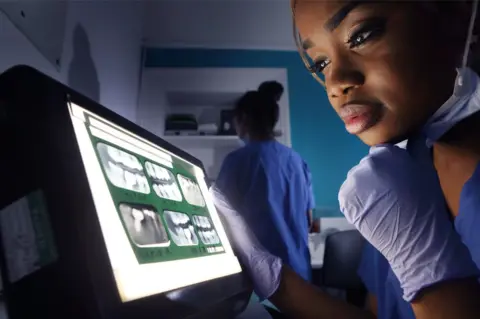 Peter Cade
Peter CadeBBC research has found nine out of every 10 NHS dental practices across the UK are not accepting new adult patients for treatment under the health service, and 80% of NHS practices are not taking on children.
The Department of Health says an extra £50m has been made available "to help bust the Covid backlogs" and states improving NHS access is a priority. Would-be patients and dentists in the East of England describe a system at a "tipping point".

'I just wanted rid of the pain'
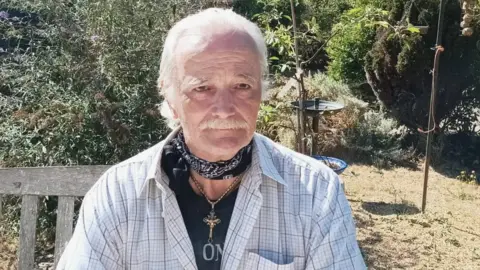 Jeremy Burchell
Jeremy BurchellIn Norfolk and Suffolk, researchers found no NHS practices accepting new adult patients, with only seven dentists in the whole of Suffolk taking on new child patients.
One practice in Norfolk told the BBC it had more than 1,700 people on its waiting list.
Jeremy Burchell, 69, from Walberswick in Suffolk, managed to get an NHS appointment in November 2021, after 13 years of trying.
But not before he had to carry out some personal dentistry in April 2021.
"I was in a great deal of pain, to the point I was almost banging my head on a wall," he says.
"My gum lines were infected. I went in the shed, grabbed a pair of pliers, twisted the tooth and pulled it out.
"I just wanted rid of the pain," he says. "I can't believe in this day and age, in the 21st century, people are finding trouble to get a dentist."

'The figures are shocking'
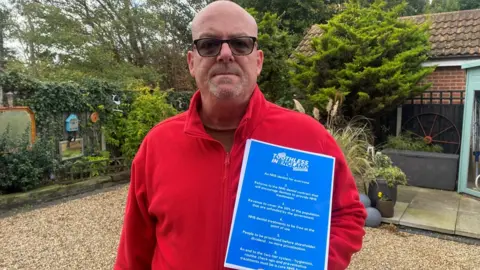 John Fairhall/BBC
John Fairhall/BBCMark Jones is coordinator of Toothless in England, which grew out of a campaign that started in Suffolk.
"The figures are shocking but we're not surprised," says Mr Jones.
"It seems no one in government is listening. We've had successive governments now that have prevaricated over reforming the NHS contract.
"It's an NHS contract that was declared unfit by their own people in 2008 as being unfit for purpose," he says. "It's a contract that puts targets in front of patients."
Mr Jones is calling for "radical reform and proper funding" for NHS dentistry.
"For years we have been drawing from the well of goodwill offered by dedicated dental professionals who want to provide NHS treatment...what this survey confirms is that the well of goodwill is coming up dry," he says.
In a statement an NHS spokesperson said: "The NHS recently announced the first dentistry reforms since 2006 which will support practices to improve access, including giving high performing practices the opportunity to increase their activity and treat more patients - with discussions around further changes that benefit patients and staff still ongoing."

'Tipping point'
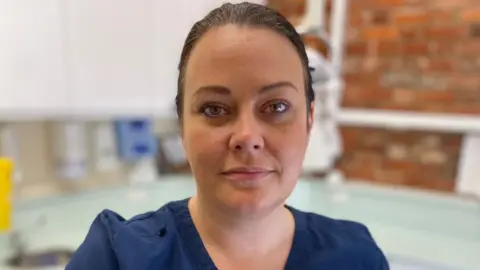 Debbie Tubby/BBC
Debbie Tubby/BBCHannah Woolnough chairs the Suffolk branch of the British Dental Association. She also works at Island House Dental Care in Woodbridge.
Of the BBC data, she says: "unfortunately it's not a surprise."
Ms Woolnough claims dental access has been an issue for decades and says the service is now at "tipping point".
Covid made the situation worse nationally, she says, adding: "Before (Covid) it was more localised, [it] just made it difficult to recruit to areas like the Fens, or Cornwall or Cumbria, but now it's a national issue."
She also blamed the NHS contracts for the lack of dentists.
"It's not a functional contract," she says. "There are often circumstances where practices are having to subsidise their NHS work with private practice work.
"There are many situations where practices will be making a significant loss, on their NHS dentistry."
She says: "Unless there is a fundamental change at government level with regards to funding in the contracts, we're not going to see an improvement in this access crisis."
Ms Woolnough compares "tweeks" by government to the 2006 contract, which come into effect from September to "sticking plasters" and called for a new deal to be worked out.
"It's time the treasury put some funding in the service," she says.

'Immensely difficult'
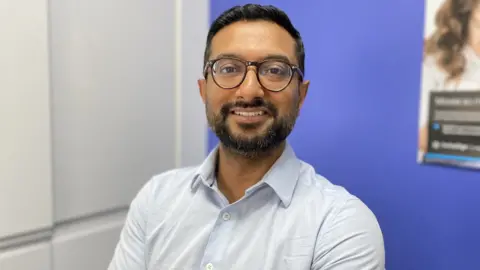 Ben Schofiled/BBC
Ben Schofiled/BBCDr Amiras Chokshi, principal dentist with Nicholas Burnett and Associates in Cambridge, says his practice has stopped taking NHS patients after reaching capacity.
However it does have space on a daily basis to see people who are in pain.
"We prioritise vulnerable groups and we try and see the most desperate and urgent people first, but it's difficult to meet the demand," says Dr Chokshi.
The practice has seen 12,000 patients in the last two years. He says it has now been forced to close its waiting list as "unfortunately we simply cannot get through the backlog".
It's been "immensely difficult" to explain to people they could not be seen on the NHS, he says.
Dr Chokshi explains that while they could once say to patients they would be seen in a three or six month period, "now we can't guarantee when we can see people".
"Dentistry I think has been in a crisis for the past five or six years, and then Covid has exacerbated the issue," he says, adding that 3,000 NHS dentists have left the profession in the past two years in the country.
The areas of Cambridgeshire, Luton and Northamptonshire areas have all struggled to provide sufficient NHS dentists to meet demand.
Dr Chokshi says the region has seen "quite a large population growth" but "we've had no extra funding" to match that increase.
"Ultimately, we've never really had enough funding to serve the whole population," he says.
"The British Dental Association have done their figures and it suggests that 50% of the population is accounted for with funding, the rest isn't."

Find BBC News: East of England on Facebook, Instagram and Twitter. If you have a story suggestion email [email protected]
